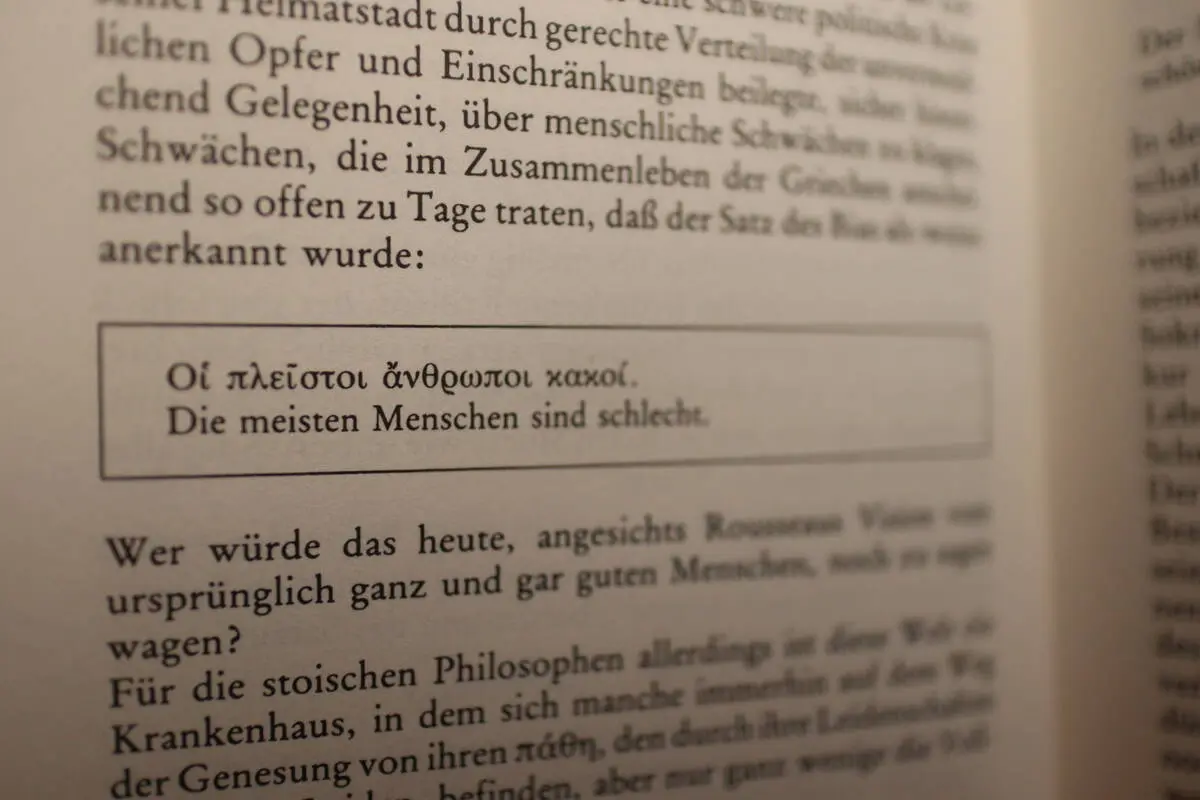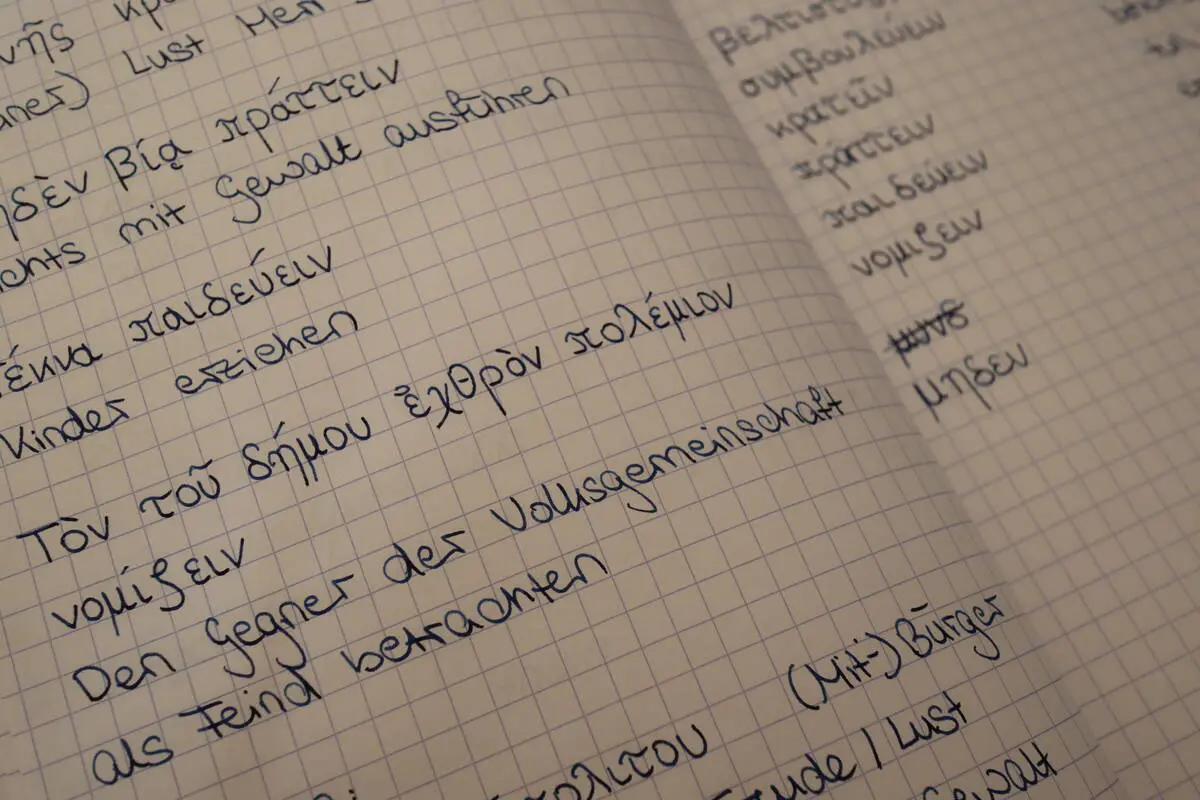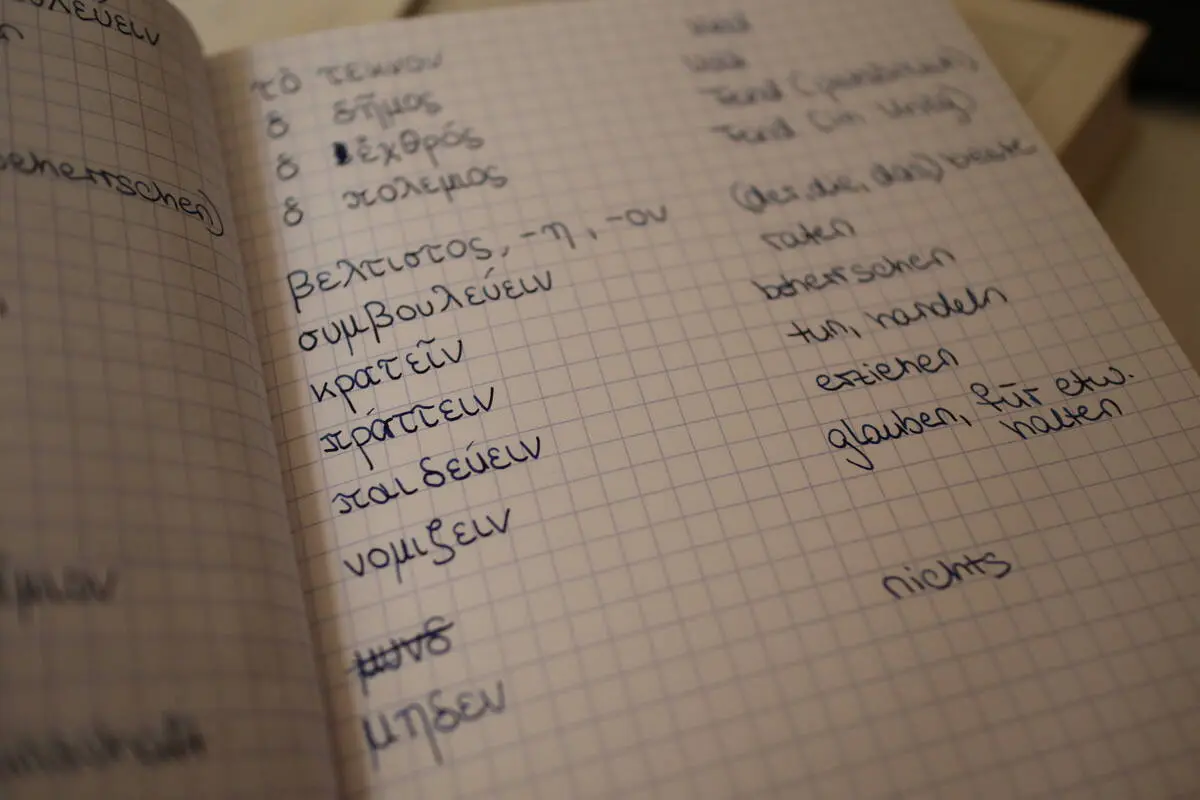Gerhard Fink’s Die Griechische Sprache
Μετὰ βιβλίου τινὸς Γερμανίαθεν ταύτην τὴν γλῶτταν μὴ μάθῃς
Do not learn this language with some book from Germany

Heed my warning carefully and don’t simply waltz into your local library and pick out a book on Ancient Greek at random, no matter what language it is written in, for the book you might happen to pick up might turn out to be absolutely abysmal; as was the case with the book I had picked up. Its name remains, for now, a mystery. The image seen above can be easily adapted to adequately describe my feelings towards this book — τὰ πλεῖστα βιβλία κακά.
Update 11.11.2020: As I will mention further below, I was, at the time of writing this, unaware of the book’s name. I have, however, since then been able to ascertain the book’s title and author, mostly by chance. I was looking for something totally unrelated in a chat between a friend of mine and me and stumbled upon this photo that I had sent him of the book’s cover. I can thus proclaim now that the book is Gerhard Fink’s book, titled Die griechische Sprache
. Upon taking it upon myself to inspect a handful of reviews online, I found out that I appear to be somewhat of a minority when it concerns my opinion of the book’s teaching method. I am stating this simply so that you may not think the opinions stated below are in any way reflective of what the majority of people who have read this book think of it — at least those who have published their opinions online. Please also consider that these opinions stem mostly from my somewhat dim memory of the matter and that I do not have the book at hand at present — and am unfortunately unable to get it due to the pandemic. If, at some point, I am once more able to get my hands on this book, I will amend this page with further details. For now, however, the opinions stated below still hold true.
As you may know, I had previously toyed with the idea of studying Ancient Greek and decided to simply walk into my local library in Bielefeld and pick out a book that I thought might be adequate — it wasn’t. Unfortunately, this attempt of learning Ancient Greek was in October of 2019 and thus, at the time of writing this, a year ago; and whilst I did take a handful of photos of the book and the notes I took, I did not take a photo of the book’s cover and am, therefore, unable to actually tell you what its name was. My library also does not appear to save what books you have previously lent and thus makes finding out what the book was nigh-impossible. I could, in theory, walk to the library and scour through all of the books on Ancient Greek — of which there weren’t many —, but because of the currently rising SARS-CoV-2 cases here in Germany and my city as well, I have decided not to do so.

Should I ever find out its name again, I will amend this page with the book’s title and a few more lines of information. As I presently stands, however, I am unable to provide you with any in-depth information about the book; I will, however, be writing in great detail about what made me want to throw this book into a corner.
This may sound like a rather drastic measure, but I assure you that it was warranted; indeed, the book made me question my sanity; it made me question whether I was still mentally fit or whether I had — unbeknownst to me — received a blow to the head that diminished by ability to absorb information adequately. This book embodies everything that I despise about bad language books and I might even call this the epitome of a subpar textbook.
It was in October 2019, as mentioned previously, that I decided to go into the library. This was, obviously, a few months before SARS-CoV-2 became a problem and the wish of going to the library was not an unwarranted one at a time before the virus; indeed, even wearing a mask would not become normal until about half a year later. Nevertheless, I decided to stroll into the library and look around. At that time I was still passionately
learning Ancient Egyptian but, as I had always been drawn to Ancient Greece, decided that learning Ancient Greek might also prove rather interesting; this is especially since I had wanted to read Plato, Epictetus, Seneca and Marcus Aurelius in their original language — this later expanded to the New Testament. As a rule of thumb, I tend to prefer to visit the local university when I am looking for a particular non-fiction book; but as that’s somewhat farther away than the regular library, I decided to test my luck there, instead.
Upon having arrived and gone to the relatively small section on foreign languages, I found only one book on Ancient Greek which I then promptly checked out and took home with me. I could not have possibly imagined that it would entirely destroyed my interest in learning the language for almost another year. Having checked it out, I immediately took the bus home and started learning and quickly realising that this book was absolutely appalling and that it could not possibly teach me the language satisfactorily.
All of the following is speaking merely from memory as I have — as mentioned above — not yet been able to find out this book’s name. Nevertheless, I remember the general structure of the book and the notes I took help me contextualise everything; and both of these things paint a truly dark picture.

Indeed, I was unable to go much beyond the first chapter as the way the way the author structured
his book — if indeed one may call it a structure
at all — was rather disorderly. Indeed, he introduces rather strange vocabulary and very advanced grammatical concepts right away and he also appears to expect the μαθητής to read Greek poetry in the first chapter of the book — a rather gargantuan task if you ask me.
Not unsurprisingly, I would say, I was rather stumped and learnt very little. There were no real exercises and very little reinforcement of the grammar that was learnt or, perhaps more accurately, the grammar thrown at the learner. One is given grammatical tables to memorise (such as the declination of nouns) and immediately gets greeted by a poem that is beyond my capabilities even now; surprisingly enough, I actually made a copy of it and it goes as follows: —
εὕδουσι δ᾽ ὀρέων κορυφαί τε καὶ φάραγγες
πρώονές τε καὶ χαράδραι
φῦλά τ᾽ ἑρπέτ᾽ ὅσα τρέφει μέλαινα γαῖα
θῆρές τ᾽ ὀρεσκῷοι καὶ γένος μελισσᾶν
καὶ κνώδαλ᾽ ἐν βένθεσσι πορφυρέας ἁλός·
εὕδουσι δ᾽ οἰωνῶν φῦλα τανυπτερύγων.
This poem, written by the poet Αλκμάν (Alcman) is clearly rather complex and 99% of the words in this I have never heard of nor seen and it is thus beyond my understanding why such a text should be chosen and be presented to the learner at the end of the first chapter. Indeed, past me could not have put it more adequately: —
In diesem Gedicht befindet sich eine sehr große Anzahl an neuen Vokabeln und grammatikalischen Konzepten.
This poem contains a great number of new vocabulary and grammatical concepts.
Undoubtedly, a quote of Socrates comes to mind which, although used in a different context, fits rather adequately here as well, ἓν οἶδα ὅτι οὐδὲν οἶδα
(One thing I know, namely that I know nothing) — though whether he actually said this is debatable.
This latter quote of mine was actually one of the last things I wrote down as part of my study of this book as I quickly realised that this was not going to be a very productive affair. I am as of yet entirely perplexed in regards to who this book’s target audience was supposed to be. It does contain a rather large amount of cultural commentary and thus helps you understand the culture of this ancient civilisation better; but it was meant to be a book on learning the Ancient Greek language. Why in God’s name words such as ἡ μέλισσα (the bee) are introduced in the first chapter is beyond me — and I am in no way trying to downplay the importance of bees here, but rather trying to grasp why words that the average beginner of this language would not come across are being used this early on.
Having written my own book teaching beginners to read Ancient Egyptian I have gathered some experience in this field; not much, admittedly, but enough to understand how I personally think a language should be introduced to the amateur and I am quite sure that the approach used in this particular book does not follow the approach that I would have taken at all. Perhaps it is aimed at those who have previously studied the language — which would then explain the rather sudden entrance into very advanced territory — but as I remember, it made itself out to be a book for complete beginners. Explaining the grammatical concepts more thoroughly and presenting the student with a larger amount of simpler texts to read would, in my opinion at least, improve this book greatly. Additionally, holding back the somewhat advanced grammatical concepts would also have the benefit of people not giving up after just the first chapter.